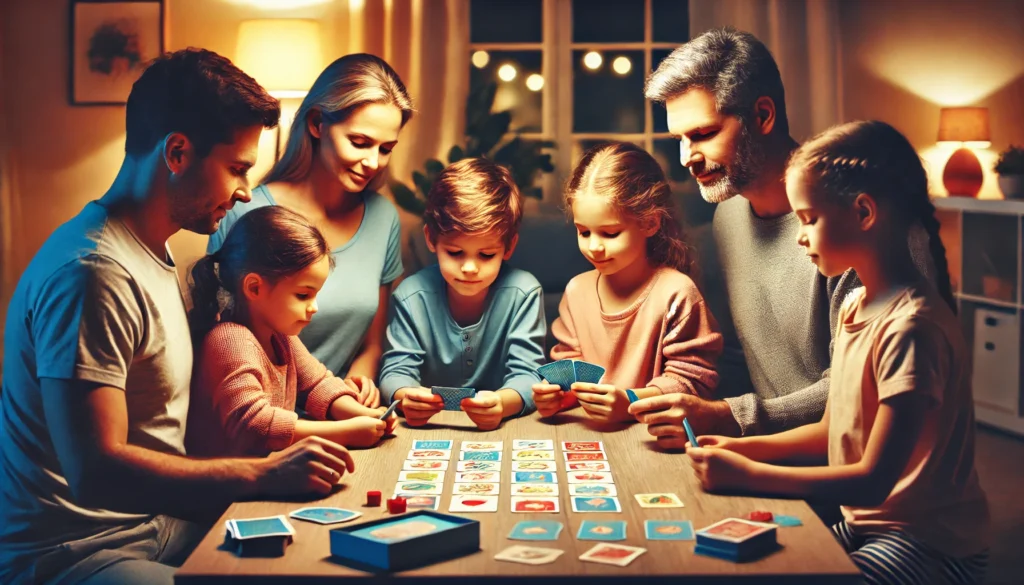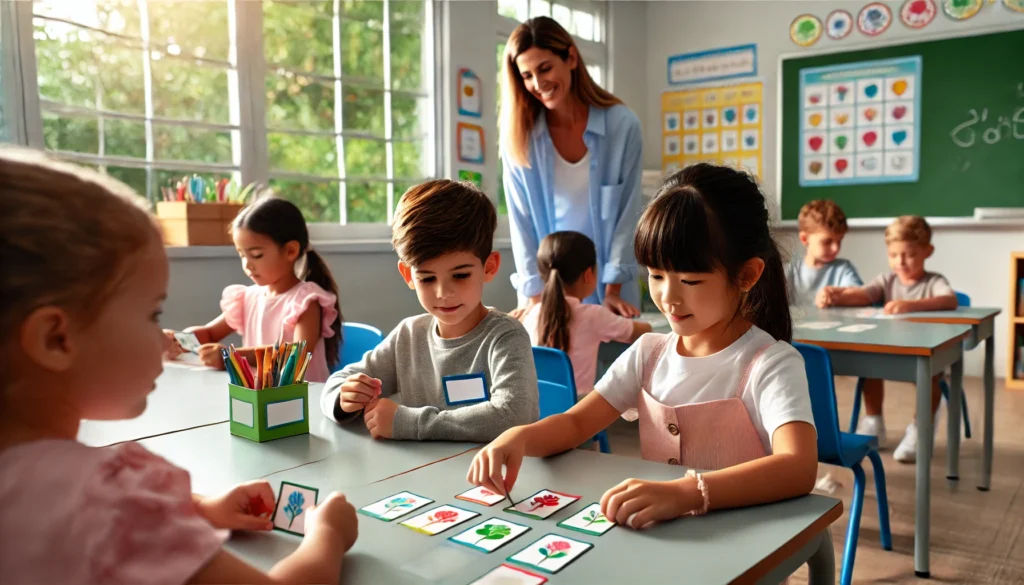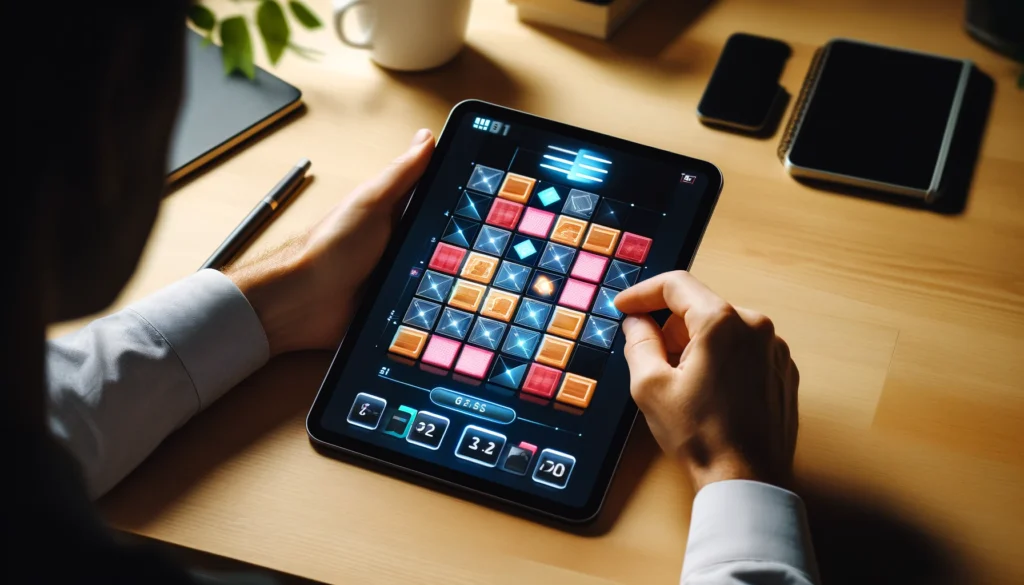Understanding the cognitive mechanics involved in memory games is crucial before diving into strategies. These games engage several brain functions, including attention, pattern recognition, and short-term memory, fostering neural connections and enhancing cognitive plasticity.
You may also like: Boost Your Mind: Top Brain Games
The Cognitive Mechanics
Memory games require a seamless interplay between various cognitive processes. Attention helps players concentrate on the task at hand, while pattern recognition aids in identifying similarities and differences among game elements. Short-term memory, meanwhile, is pivotal for recalling the positions and sequences necessary to succeed.
Neural Connections and Plasticity
Engaging in memory games regularly can lead to the formation of new neural pathways. This neural growth is a result of the brain’s plasticity, its remarkable ability to reorganize itself by forming new connections. Regular mental stimulation through these games can enhance cognitive resilience, making it easier to adapt to new challenges.
Brain Health Across Lifespan
Memory games are not merely beneficial for children; they offer cognitive advantages across all age groups. In young individuals, they bolster developmental skills, while in older adults, they may slow the progression of cognitive decline. The adaptability of these games makes them a suitable cognitive exercise for everyone, regardless of age.
Why Memory Games Matter
Memory games serve as a practical and enjoyable means to boost mental agility. They are particularly beneficial for children, aiding in the development of concentration and problem-solving skills. For adults, these games can act as a mental exercise, potentially staving off cognitive decline and enhancing memory retention.
Enhancing Concentration
For children, engaging with memory games can significantly improve concentration levels. These games demand sustained attention, which can translate into better focus in academic and everyday settings. The repetitive nature of memory games also reinforces the ability to concentrate on tasks for extended periods.
Cognitive Development in Children
Apart from concentration, memory games contribute to overall cognitive development in children. By encouraging problem-solving and logical thinking, these games help young minds to develop critical cognitive skills. They also teach children how to follow rules and adapt to changing game dynamics, which are essential life skills.
Adult Cognitive Maintenance
For adults, memory games serve as a form of mental exercise that helps keep the brain sharp. They are particularly effective in enhancing memory retention and recall abilities. Regular engagement with these games can also delay the onset of age-related cognitive decline, providing a fun and effective way to maintain mental health.
Getting Started: How to Play Memory Games
Memory games come in various formats, but the most popular are card-based games. Here’s a step-by-step guide on how to play a basic memory card game:
- Setup: Shuffle a deck of cards and lay them face down in rows on a flat surface.
- Gameplay: Players take turns flipping over two cards at a time, trying to find matching pairs.
- Objective: The goal is to remember the location of the cards and collect as many pairs as possible.
- Winning: The player with the most pairs at the end of the game wins.
Card Game Variations
While the basic rules are straightforward, numerous variations can add complexity and excitement, such as introducing wild cards or setting time limits for each turn.
Introducing Complexity
To increase the challenge, consider adding multiple decks or incorporating thematic elements. This not only enhances the difficulty level but also keeps the game fresh and engaging. Introducing wildcards that can change the course of the game adds a strategic layer that requires adaptability and quick thinking.
Timed Challenges
Setting a time limit for each turn can add a thrilling pressure element to the game. Timed challenges force players to make quick decisions and rely on their instinctive memory recall. This variation can enhance the excitement and competitiveness of the game, making it more engaging for players.
Cooperative Play
Memory games can also be played cooperatively, where players work together to achieve a common goal. This variation emphasizes communication and teamwork, allowing players to share strategies and pool their collective memory. Cooperative play can be particularly beneficial in educational settings, promoting social interaction and collaborative problem-solving.

Strategies for Success in Memory Games
Success in memory games hinges on a combination of strategies that enhance focus, recall, and pattern recognition. Here are some expert tips to elevate your game:
Focus and Concentration
- Minimize Distractions: Play in a quiet environment to maintain focus.
- Mindfulness Practice: Engage in deep breathing or meditation before playing to sharpen attention.
The Art of Focus
Playing memory games requires undivided attention. Finding a quiet space free from distractions is crucial to maintaining focus. This environment allows players to immerse themselves fully in the game, improving their ability to concentrate and remember card positions.
Pre-Game Mindfulness
Before starting a game, taking a few moments to practice mindfulness can significantly enhance concentration. Techniques such as deep breathing or brief meditation sessions can calm the mind, reducing stress and clearing mental clutter. This pre-game ritual sharpens attention and prepares players for the cognitive challenges ahead.
Pattern Recognition and Chunking
- Look for Patterns: Group cards by colors, shapes, or themes to make recall easier.
- Chunking Technique: Break down the card layout into smaller sections to reduce cognitive load.
Identifying Patterns
Recognizing patterns is a powerful strategy in memory games. By grouping cards based on shared characteristics like color or shape, players can simplify the recall process. This method leverages the brain’s natural affinity for patterns, making it easier to remember card positions and improve performance.
The Chunking Approach
Chunking involves breaking down information into manageable sections. In memory games, players can divide the card layout into smaller, more digestible parts. This technique reduces cognitive load and prevents players from feeling overwhelmed, enabling them to focus on one section at a time and improve their overall recall.
Memory Techniques
- Visualization: Create vivid mental images of card positions to aid recall.
- Association: Link cards with familiar objects or concepts to enhance memory connections.
Visualizing Success
Visualization is a powerful memory technique that involves creating mental images of card positions. By picturing the layout in their mind, players can improve their recall abilities. This technique taps into the brain’s visual memory, making it easier to remember specific card locations during gameplay.
Building Associations
Association is another effective memory technique that involves linking cards with familiar objects or concepts. By creating connections between the cards and something memorable, players can enhance their memory retention. This strategy leverages the brain’s natural tendency to remember familiar and meaningful information.
Memory Games for Kids: A Learning Tool
Memory games are not only fun but also an educational tool for children. They support the development of essential skills such as concentration, logical thinking, and the ability to follow rules. Here are some age-appropriate games and tips:
Game Suggestions for Different Ages
- Toddlers (Ages 2-4): Use cards with simple images and fewer pairs.
- Preschoolers (Ages 4-6): Introduce cards with numbers or letters to blend learning with play.
- School Age (Ages 6+): Increase complexity with more cards and thematic challenges.
Tailored Games for Toddlers
For toddlers, memory games should be simple and engaging. Using cards with bright colors and simple images helps capture their attention. Limiting the number of pairs ensures the game remains manageable, allowing toddlers to experience the joy of matching cards without becoming frustrated.
Educational Play for Preschoolers
Preschoolers can benefit from slightly more complex memory games that incorporate numbers or letters. These games not only enhance memory skills but also introduce basic educational concepts. By blending learning with play, preschoolers can develop cognitive skills while having fun.
Challenging School Age Kids
For school-age children, memory games can become more challenging with the introduction of thematic elements or additional cards. These games encourage critical thinking and strategic planning. By increasing complexity, school-age kids are pushed to develop advanced memory techniques and problem-solving skills.
Encouraging Engagement
- Interactive Play: Join in the game to encourage participation and model strategic thinking.
- Positive Reinforcement: Praise effort and strategy use, rather than just winning.
Participative Play
Playing memory games with children can significantly enhance their engagement. By participating in the game, parents or educators can model strategic thinking and demonstrate effective memory techniques. This interactive play fosters a supportive learning environment and encourages children to think critically.
Celebrating Effort
Positive reinforcement is a powerful tool in encouraging children to engage with memory games. Praising effort, strategy use, and improvement, rather than just focusing on winning, helps children develop a growth mindset. This approach fosters resilience and motivates them to continue learning and improving their skills.

The Evolution and Future of Memory Games
Memory games have a rich history, evolving from traditional card games to digital applications. With advancements in technology, these games continue to adapt, offering new and innovative ways to engage the brain.
Digital Memory Games
The transition to digital platforms has expanded the accessibility and variety of memory games. Apps and online games provide interactive experiences that can be tailored to individual skill levels and preferences.
Bridging Traditional and Digital
Digital memory games offer unique advantages over traditional formats. They can be easily customized to suit different skill levels, ensuring a tailored experience for each player. Online platforms also provide a vast array of game choices, allowing players to explore different themes and styles that keep them engaged and challenged.
Interactive Learning Experiences
Digital memory games often incorporate interactive elements that enhance learning and engagement. Features such as instant feedback, adaptive difficulty levels, and interactive tutorials provide a more immersive experience. These elements cater to various learning styles, making digital memory games an effective educational tool for players of all ages.
The Role of AI and VR
Emerging technologies like artificial intelligence (AI) and virtual reality (VR) are poised to revolutionize memory games by offering immersive and adaptive learning experiences.
AI-Driven Personalization
Artificial intelligence can analyze player performance and adapt game difficulty to match individual skill levels. This personalization ensures that players are constantly challenged, preventing boredom and promoting continuous cognitive growth. AI-driven games can also provide tailored feedback and suggestions, helping players improve their memory techniques.
Immersive VR Experiences
Virtual reality offers an unparalleled level of immersion, transforming traditional memory games into fully immersive experiences. VR environments can simulate real-world scenarios that require memory recall, providing a unique and engaging way to train cognitive skills. These immersive experiences can make memory games more appealing and effective, particularly for younger audiences.

Conclusion: The Cognitive Benefits of Memory Games
Incorporating memory games into your routine can offer more than just entertainment; they serve as a valuable tool for cognitive enhancement. Whether you’re a health and wellness coach seeking engaging activities for clients, a science journalist exploring cognitive trends, or a biohacker optimizing brain health, memory games provide a compelling blend of fun and mental exercise.
A Comprehensive Cognitive Tool
Memory games are a versatile and comprehensive tool for cognitive enhancement. They can improve memory retention, concentration, and problem-solving skills, making them an essential addition to any mental fitness regimen. By challenging the brain in a fun and engaging way, memory games contribute to overall cognitive health.
Tailoring to Diverse Needs
Memory games can be tailored to meet the diverse needs of different individuals. Whether it’s a simple card game for children or a complex digital application for adults, these games offer various levels of challenge and engagement. This adaptability makes them suitable for a wide range of audiences, from casual players to cognitive enthusiasts.
Embracing the Challenge
Embrace these strategies and tips to not only improve your memory game skills but also to enrich your cognitive toolkit, fostering a sharper, more agile mind. By integrating memory games into your routine, you can enjoy the benefits of enhanced cognitive function while having fun. Whether played alone or with others, memory games offer a rewarding and stimulating experience that can be enjoyed by all.
Further Reading:
The Memory Game: Making It Meaningful
Important Note: The information contained in this article is for general informational purposes only, and should not be construed as health or medical advice, nor is it intended to diagnose, prevent, treat, or cure any disease or health condition. Before embarking on any diet, fitness regimen, or program of nutritional supplementation, it is advisable to consult your healthcare professional in order to determine its safety and probable efficacy in terms of your individual state of health.
Regarding Nutritional Supplements Or Other Non-Prescription Health Products: If any nutritional supplements or other non-prescription health products are mentioned in the foregoing article, any claims or statements made about them have not been evaluated by the U.S. Food and Drug Administration, and such nutritional supplements or other health products are not intended to diagnose, treat, cure, or prevent any disease.


